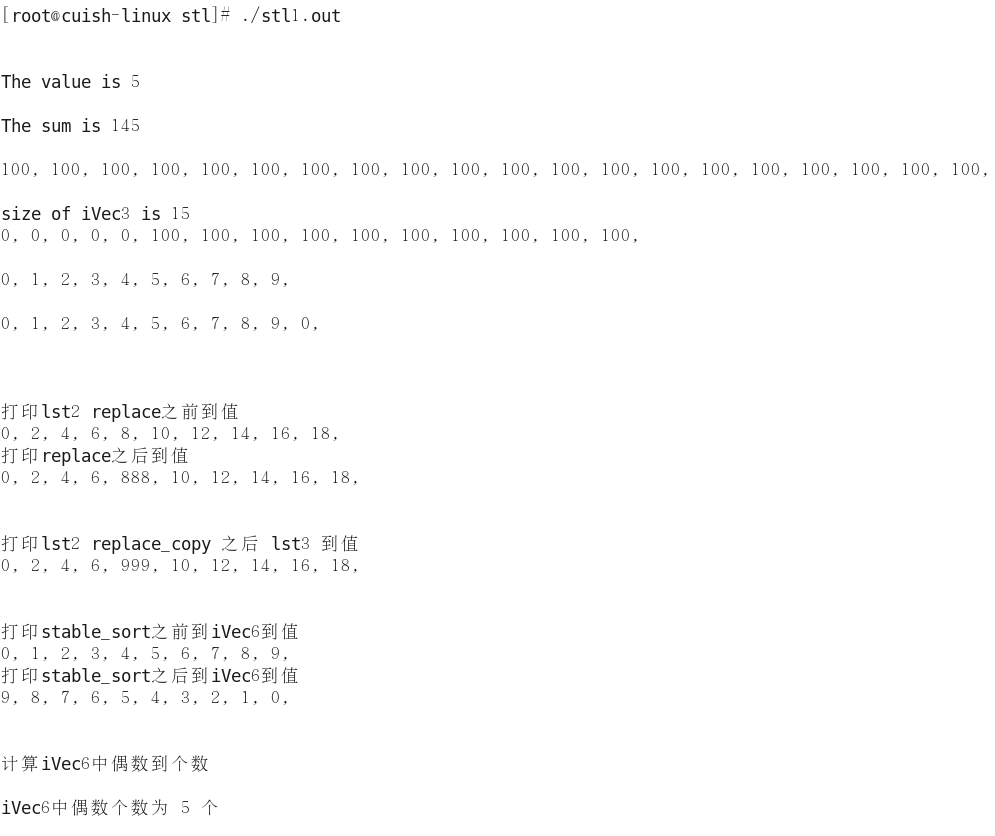【STL】帮你复习STL泛型算法 一
STL泛型算法
#include <iostream>
#include <vector>
#include <algorithm>
#include <iterator>
#include <numeric>
#include <list>
using std::cout;
using std::endl;
using std::vector;
using std::list; bool IsOushu(const int& nNum);
bool IsBigger(const int& nFirst, const int& nSecond); int main()
{
vector<int> iVec;
for(int i = ; i < ; ++ i)
iVec.push_back(i); cout << endl;
typedef vector<int> IVEC; //std::find
IVEC::const_iterator iter = std::find(iVec.begin(), iVec.end(), );
if(iVec.end() != iter)
cout << endl << "The value is " << *iter << endl;
else
cout << endl << "Can not find the value " << << endl; //std::accumulate
int nSum = std::accumulate(iVec.begin(), iVec.end(), );
cout << endl << "The sum is " << nSum << endl; cout << endl; //fill
vector<int> iVec2();
std::fill(iVec2.begin(), iVec2.end(), );
for(IVEC::const_iterator iter = iVec2.begin(); iter != iVec2.end(); ++ iter)
cout << *iter << ", "; cout << endl; //fill_n
vector<int> iVec3();
std::fill_n(back_inserter(iVec3), , );
cout << endl << "size of iVec3 is " << iVec3.size() << endl;
for(IVEC::const_iterator iter = iVec3.begin(); iter != iVec3.end(); ++ iter)
cout << *iter << ", ";
cout << endl; cout << endl; //copy
vector<int> iVec4;
list<int> lst1;
for(int i = ; i < ; ++ i)
lst1.push_back(i); std::copy(lst1.begin(), lst1.end(), back_inserter(iVec4));
for(IVEC::const_iterator iter = iVec4.begin(); iter != iVec4.end(); ++ iter)
cout << *iter << ", ";
cout << endl << endl; //copy
vector<int> iVec5();
std::copy(lst1.begin(), lst1.end(), iVec5.begin());
for(IVEC::const_iterator iter = iVec5.begin(); iter != iVec5.end(); ++ iter)
cout << *iter << ", ";
cout << endl << endl; //replace
list<int> lst2;
for(int i = ; i < ; ++ i)
lst2.push_back(i * );
cout << endl; //打印replace之前到值
cout << endl << "打印lst2 replace之前到值 " << endl;
for(list<int>::const_iterator iter = lst2.begin(); iter != lst2.end(); ++ iter)
cout << *iter << ", ";
cout << endl;
cout << "打印replace之后到值 " << endl;
std::replace(lst2.begin(), lst2.end(), , );
for(list<int>::const_iterator iter = lst2.begin(); iter != lst2.end(); ++ iter)
cout << *iter << ", ";
cout << endl; cout << endl;
//replace_copy
list<int> lst3(lst2.size());
std::replace_copy(lst2.begin(), lst2.end(), lst3.begin(), , );
cout << endl << "打印lst2 replace_copy 之后 lst3 到值 " << endl;
for(list<int>::const_iterator iter = lst3.begin(); iter != lst3.end(); ++ iter)
cout << *iter << ", ";
cout << endl; //stable_sort
vector<int> iVec6;
for(int i = ; i < ; ++ i)
iVec6.push_back(i);
cout << endl;
cout << endl << "打印stable_sort之前到iVec6到值 " << endl;
for(IVEC::const_iterator iter = iVec6.begin(); iter != iVec6.end(); ++ iter)
cout << *iter << ", ";
cout << endl << "打印stable_sort之后到iVec6到值 " << endl; std::stable_sort(iVec6.begin(), iVec6.end(), IsBigger); for(IVEC::const_iterator iter = iVec6.begin(); iter != iVec6.end(); ++ iter)
cout << *iter << ", ";
cout << endl << endl; //count_if
cout << endl << "计算iVec6中偶数到个数 " << endl;
int nNums = std::count_if(iVec6.begin(), iVec6.end(), IsOushu);
cout << endl << "iVec6中偶数个数为 " << nNums <<" 个" << endl; cout << endl << endl; cout << "\nThis is main function \n";
return ; } //stable_sort 降序排列
bool IsBigger(const int& nFirst, const int& nSecond)
{
return nFirst > nSecond;
} //是偶数
bool IsOushu(const int& nNum)
{
return ( == nNum % );
}
执行结果

【STL】帮你复习STL泛型算法 一的更多相关文章
- STL的一些泛型算法
源地址:http://blog.csdn.net/byijie/article/details/8142859 从福州大学资料里摘下来的我现在能理解的泛型算法 algorithm min(a,b) 返 ...
- STL区间成员函数及区间算法总结
STL区间成员函数及区间算法总结 在这里总结下可替代循环的区间成员函数和区间算法: 相比单元素遍历操作,使用区间成员函数的优势在于: 1)更少的函数调用 2)更少的元素移动 3)更少的内存分配 在区间 ...
- stl之容器、迭代器、算法几者之间的关系
转自:https://blog.csdn.net/bobodem/article/details/49386131 stl包括容器.迭代器和算法: 容器 用于管理一些相关的数据类型.每种容器都有它的优 ...
- Effective STL 学习笔记 31:排序算法
Effective STL 学习笔记 31:排序算法 */--> div.org-src-container { font-size: 85%; font-family: monospace; ...
- 泛型编程、STL的概念、STL模板思想及其六大组件的关系,以及泛型编程(GP)、STL、面向对象编程(OOP)、C++之间的关系
2013-08-11 10:46:39 介绍STL模板的书,有两本比较经典: 一本是<Generic Programming and the STL>,中文翻译为<泛型编程与STL& ...
- C++ Primer 学习笔记_45_STL实践与分析(19)--泛型算法的结构
STL实践与分析 --泛型算法的结构 引言: 正如全部的容器都建立在一致的设计模式上一样,算法也具有共同的设计基础. 算法最主要的性质是须要使用的迭代器种类.全部算法都指定了它的每一个迭代器形參可使用 ...
- C++ 泛型算法
<C++ Primer 4th>读书笔记 标准容器(the standard container)定义了很少的操作.标准库并没有为每种容器类型都定义实现这些操作的成员函数,而是定义了一组泛 ...
- C++的那些事:容器和泛型算法
一.顺序容器 1,标准库定义了3种类型的顺序容器:vector.list和deque.它们的差别主要在于访问元素的方式,以及添加或删除元素相关操作运算代价.标准库还提供了三种容器适配器:stack.q ...
- C++ Primer : 第十章 : 泛型算法 之 只读、写和排序算法
大多数算法都定义在<algorithm>头文件里,而标准库还在头文件<numeric>里定义了一组数值泛型算法,比如accumulate. ● find算法,算法接受一对迭代 ...
随机推荐
- Linux Shell 数字计算与比较
直接上脚本, 使用$(())以及$[]进行数字计算 数值比较:n1 -eq n2检查n1是否等于n2 n1 -le n2检查n1是否小于等于n2n1 -ge n2检查n1是否大于等于n ...
- lintcode:最大子正方形
题目: Maximal Square Given a 2D binary matrix filled with 0's and 1's, find the largest square contain ...
- 为什么开发者热衷在Stack Overflow上查阅API文档?
摘要:一项新研究跟踪了Android开发者的访问历史,发现开发者多达二分之一的文档是从Stack Overflow上获取到的,而Stack Overflow上的示例也多于官方指南,开发者通过搜索更多时 ...
- UML建模之活动图介绍(Activity Diagram)
一.活动图的组成元素 Activity Diagram Element 1.活动状态图(Activity) 2.动作状态(Actions) 3.动作状态约束(Action Constraints) 4 ...
- Linux和Linux之间共享目录
1.Linux 服务器端NFS服务器的配置 以root身份登陆Linux服务器,编辑/etc目录下的共享目录配置文件exports,指定共享目录及权限等. 执行如下命令编辑文件/etc/exports ...
- (转)最新版的SSH框整合(Spring 3.1.1 + Struts 2.3.1.2 + Hibernate 4.1)
最近一直有朋友在问,最新版的Spring.Struts.Hibernate整合老是有问题,昨晚大概看了一下.从Hibernate 4 开始,本身已经很好的实现了数据库事务模块,而Spring也把Hib ...
- 完美配置Tomcat的HTTPS
Tomcat配置HTTPS的文章到处都有,过程也比较简单,随后文中会转一段过来. 但对于启用APR情况下报异常“java.lang.Exception: Connector attribute SSL ...
- jsp中四种传递参数的方法
jsp中四种传递参数的方法如下: 1.form表单 2.request.setAttribute();和request.getAttribute(); 3.超链接:<a herf="i ...
- vim常用命令 vim键盘布局
vim键盘布局,vim快捷键 vim常用命令:
- hdu 4972 A simple dynamic programming problem (转化 乱搞 思维题) 2014多校10
题目链接 题意:给定一个数组记录两队之间分差,只记分差,不记谁高谁低,问最终有多少种比分的可能性 分析: 类似cf的题目,比赛的时候都没想出来,简直笨到极点..... 最后的差确定,只需要计算和的种类 ...
